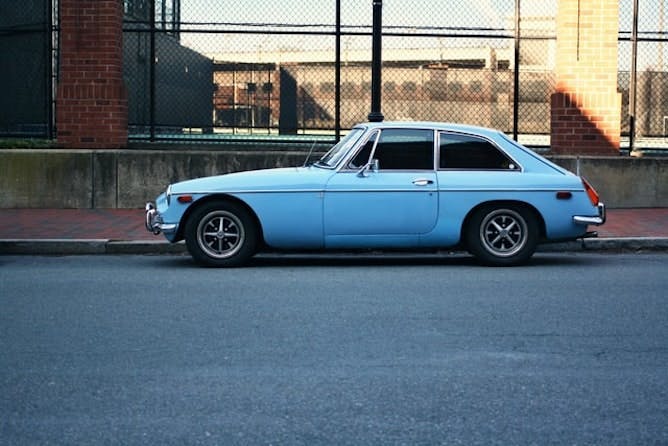How to get Cheap Car Insurance using Price Comparison Sites
February 13, 2024
•10 min read
Leon McKenzie
Content Writer

The least fun aspect of driving is dealing with the admin that goes alongside it. Hunting for cheap car insurance is not only time-consuming but also ends in you spending a tonne of money on a service that, hopefully, you’ll never have to use. That’s where price comparison sites come in. They have really changed the game, making the whole process smoother, quicker—and likely to save you some dough.
Whether you’re a learner driver looking to get some practice in between your lessons or a veteran behind the wheel, we’ll take you through how to get the best policies and the cheapest quotes for your car insurance.
How do price comparison sites work?
Price comparison sites are free to use and give you personalised quotes from a whole array of different car insurers in one go. They do all the hard work for you: with just a few clicks, they’ll rank suitable policies for you by price—and highlight other important factors too. That way you can make an informed decision quickly and easily. At a glance, you’ll be able to see things like each insurer’s compulsory excess, which extras are included as standard, and how their customers rate them.
Is there any catch? How do price comparison sites make their money?
There’s no catch, and there’s no extra cost to you as the customer. Comparison sites make their money through commission from any insurer you buy through them. That incentivises them to give you as many options as they can, with the cheapest deals possible—so that you’re more likely to purchase through them, rather than go elsewhere. For example, MoneySuperMarket¹ is a 100% independent car insurance comparison site, and they are on your side. That is why they use their own money to provide cheaper prices on a range of even policies, so you can save even more.
Finding a suitable policy is straightforward:
Input your details
Instead of having to provide endless information to each individual insurer, you fill out just one form with your personal driving details and what you require from an insurance policy.
Get your quotes
Scroll through your personalised quotes to see which policies offer you the best value for money.
Choose your policy
Click through to your preferred policy to double-check that it fully fits your brief. All good? Input your card details and you’re good to go.

Price comparison sites will also email you your quotes, so that if you’re not quite ready to hit ‘buy’, you can log in and retrieve them later. It’s also easy to amend your details and look for better deals by tweaking your requirements. See our guide below for how to get the cheapest car insurance quotes.
Can price comparison sites save you money on car insurance?
Simply put, yes. Price comparison sites have a huge number of insurers on their databases, so they’re able to find you great deals with minimal effort from you. It’s always worth using one for quotes when your insurance renewal date comes up because auto-renewing is the most expensive option of all.
With Confused.com, you can compare over 120 policies in just a few minutes - and it is completely free to get a quote!
Comparison sites give service providers a lot of custom, so they can sometimes wangle deals you wouldn’t get by going direct. They often provide their own incentives as well. The following freebies are accurate as of September 2021:
- £150 garage vouchers at MoneySuperMarket to help with MOTs, services or general maintenance costs
- Choose between a HelloFresh box, 12 free car washes, a Halfords voucher or a Domino's voucher at Confused.com
Top tips for getting the best deal from a price comparison website
Using a price comparison site will automatically help you find a cheap deal. But in order to get the cheapest car insurance possible, there are some things you can do when you’re filling in your details.

Change your job title
Lots of occupations have interchangeable job titles, and you can get a better deal by calling yourself one thing rather than another. Play about by tweaking your job title slightly (within the realms of what is reasonable), and see how each one affects your quote.
Use multiple price comparison websites
If you’ve got time, it’s always worth checking out multiple sites, as no one company covers every insurer. According to money-saving guru, Martin Lewis², this is the order in which to use them (starting with the best):
Don't be Confused, be Confused.com
Look for comprehensive cover
There are three levels of car insurance cover. By law, you have to have at least the most basic cover (third-party), because if an accident is deemed to be your fault, it will be down to you to cover the costs of damage to the vehicle(s) you damaged, or people who got hurt. You pay for insurance each year to put this responsibility—which could easily amount to thousands of pounds—into the hands of your policy provider.
Third-party
Third-party insurance covers claims made by someone else against you. Your insurance (on your behalf) will cover the costs that arise from the accident for the other parties involved.
However, you won’t get a payout yourself—so if your car needs repairing, or you face having time off work due to injury, you won’t get a penny from your insurers.
Third-party, fire and theft
The middle level of cover pays out to other people if you cause an accident, but also to you if your car is stolen or burnt.
But, like third-party insurance, it still won’t pay you for any costs you personally face after an accident that’s your fault.
Comprehensive
Comprehensive insurance covers the costs for both other parties and yourself. That includes damage to all the vehicles involved, including your own, and injuries resulting from the crash.
Now, you’d probably assume that the lowest level of cover would cost the least. In reality, insurers tend to think of those who choose minimal insurance as being higher risk individuals. That drives up the prices for third-party insurance. So, not only is comprehensive insurance recommended because it covers you for far more eventualities, it’s likely to save you money as well! Causing an accident can be traumatic, and anything you can do to help ease the burden of that—whether psychologically or financially—is a good thing.
Pay upfront if you can
We know it’s not always possible to shell out for your insurance premium all at once, but if you can, paying a lump sum annually will usually save you hundreds of pounds. Insurers tend to hike up the rates of monthly payments, so although it can make it affordable in the short term, it’s not ideal if you can avoid it.
If you’re not able to pay in one go, consider whether you can save up each month to enable you to do so next year. Use this simple calculation to work out how much you’d need to save each month between now and then: Annual car insurance ÷ 12 (or the number of months left before your insurance renewal date) = Amount you need to save each month
Saving tip
If you struggle with saving, then look at the mobile banking tools available to you. Challenger banks like Monzo and Starling have popularised ring-fencing (putting some of your earnings aside into specific 'pots') to help you save. Many of the big, traditional banks have followed suit, and are now offering similar services with their current accounts.
Renew about 3 weeks early
Car insurance quotes tend to be at their cheapest approximately three weeks before your renewal date. Put a reminder in your calendar 23 days² before your insurance is due to renew so that you can take advantage of the lowest prices.
Add a named driver
Sometimes adding a more experienced driver onto your policy as a named driver can reduce your cost overall. Check the prices either way and consider that it can also be pretty handy having a trusted friend or family member able to drive your car.
Lower your voluntary excess
Different insurers have different requirements in terms of their compulsory excess—the amount you will have to pay if you ever need to call on your insurance. Check that the cheapest car insurance deal is one you can comfortably afford. You don’t want to be stuck with a high excess if you’re unlikely to have that money to hand. On top of any compulsory excess, you can choose to add a voluntary excess. Putting down a higher voluntary excess might get you a slightly cheaper deal, but not necessarily.
Experiment with different options—and remember that you’ll need to have that cash available if you cause an accident. If there’s minimal difference between, say, a £0 voluntary excess and a £250 voluntary excess, always go for the lowest voluntary excess possible. It’ll be well worth it if you ever end up needing a payout.
Carefully consider any extras
There will often be the option to add extras onto your insurance. Make sure you only choose the ones you think you’ll need—and take them into account when considering the overall cost of a policy. Some options, like breakdown cover, are really useful. However, getting it through your insurance company might see you overpaying for the service. Always check to see if it’s cheaper to go direct; here are the latest RAC deals.
Things that make your car insurance cheaper (or more expensive)

There are some details you have to disclose to your insurance company that might affect your premium—but that you won’t always have much control over. The most important thing is not to lie in the hopes that you’ll get a cheaper quote. If you give an insurer false information when you take out a policy, your insurance will probably be invalidated. That means they won’t pay out if you have an accident, and you’re also classed as driving without insurance, which is illegal and could lead to prosecution.
Mileage
To get the most suitable policy, you should take a few minutes to roughly calculate how many miles you’ll do in a year. Don’t skip this part: it sounds difficult, but it shouldn’t actually take that long. You can work out your annual mileage by taking the figure on your latest MOT certificate away from your current mileage (you'll find this on your dashboard). Divide this figure by the number of months that have passed since your MOT, then times that by 12.
Is your figure accurate enough?
The Covid pandemic may have skewed your most recent statistics. Many people drove less during the months of lockdown. If that was the case for you, you can work out your expected mileage manually. Get the calculator out, and note down how far you drive and how often.
Remember to take into account:
- Your commute (multiply this by the number of days/year you drive to and from work)
- Regular outings, like seeing nearby friends and family, and going to town or the supermarket
- Big trips you’re likely to take to go on holiday or visit people further afield
Driving convictions
If you’ve accrued any driving penalties, like points on your licence, you have to tell your insurer about them. It will probably increase your premium, but failing to tell your policyholder will mean that your insurance is invalid. In some cases, you might also have to disclose any recent driving awareness courses you've attended.
What types of journeys you’ll use the car for
Insurance firms want to know whether you drive to your workplace, or just for social reasons. This helps them gain a better idea of your level of risk when you’re out and about. Don’t be scared to say that you commute: for most people, that’s a journey you regularly undertake, so your insurers probably won’t see it as particularly high risk. On the other hand, if you have an accident on your way to or from work, but haven’t told your insurance company that you commute in your car, you might find them unwilling to pay out.
Main driver
When you’re filling out your details, you’ll be asked to note the main driver of the car—and any subsequent ‘named drivers’. The main driver must be the person who is going to be driving the car the most. Some people try to get cheap car insurance by putting down the most experienced person as the main driver, despite that person driving the car less than them. This is called fronting and is illegal.
In the long run, you’ll get future car insurance cheaper if you’re the main driver and can accrue No Claims Bonus years. If you’re only the named driver on a policy, you’re unlikely to get this benefit as standard.
Medical conditions
For drivers with a notifiable medical condition, you need to disclose this to your insurers (it’s part of the standard form on price comparison sites). You’ll just need to confirm that the DVLA knows, and put down any action they require from you to keep your full licence.
Where you park your car
Your address and what type of parking you have access to—like a garage, driveway or road—makes a difference to your insurance price. Companies assess the potential threat from thieves and vandals at times when your car is at home. If you can do something about this (like clearing out the garage to make room for your car), then it’s probably worth doing. But for most people, this isn’t something you can change—so don’t sweat it. Just compensate by putting into action our other tips for getting cheap car insurance.
Why you should get car insurance quotes now (even if your renewal isn’t due)

After January 2022, car insurers aren't able to charge existing customers more than new customers. On the face of it, that sounds like wonderful news. However, instead of slashing costs, it probably means that prices for new (and switching) customers are going to rise. It might be worth getting out of your current policy and going with a different insurer before prices are hiked. Here’s how to tell if it’s worth your while:
- Get a quote from a price comparison site, like MoneySuperMarket¹ or Confused.com¹.
- If you see a cheap insurance deal, check with your current insurer what fees you’ll need to pay to get out of your policy early. You need to make sure that the savings are worth it.
- Ask if there’s a notice period you have to serve. Don’t start paying for any new insurance until your current policy expires, otherwise, you’re increasing your costs, rather than reducing them.
- If you can make a clear saving, consider switching to the new policy. If not, sit tight, and follow our top tips for cheap car insurance once it’s time to renew.
MoneySuperMarket gives you lots of clever ways to save a lot, by doing very little; you can compare and save on over 40 products, from over 55 of the biggest insurance providers in the country.
What do I need to have to hand when I’m getting car insurance quotes?
Speed up your car insurance quotes by making sure you're fully prepared. Have these things to hand so that you can fill in your details quickly and easily:
- Your driving licence number (and those of any other drivers you’re planning to add onto the insurance).
- The date you—and any additional drivers—passed your practical tests. That will mean you can work out how many years you’ve held a full driving licence. Look at the back of your pink card to find the relevant date.
- The number of years of No Claims Bonus you’ve built up. Often it will only be the main driver on an insurance policy who collects NCB, so check your previous policies to see whether you qualify.
¹ If you use these links to make a purchase, we earn some commission. It won't cost you any more than going directly to the site. We plough all commission we receive right back into PassMeFast so we can continue to improve our services and keep providing you with free and helpful content (and help more people get cheap car insurance!). ² Figures courtesy of MoneySavingExpert, September 2021.
Subscribe for driving advice, offers & more
We'd love to let you know about our courses, news and offers via email. You may unsubscribe at any time.
Star Genie Limited trading as PassMeFast. Company number 10093359
Copyright © 2024 owned by Star Genie Limited
PassMeFast, Blue Tower, MediaCityUK, Salford, M50 2ST
